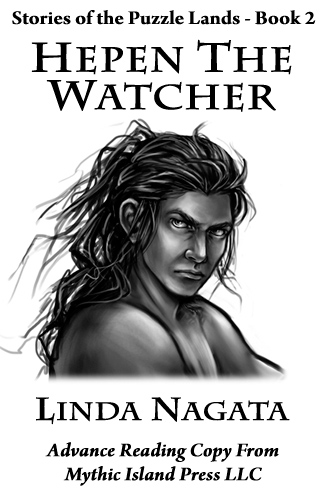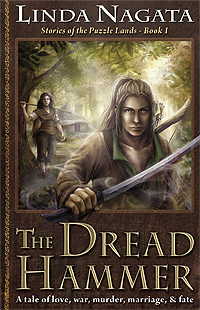Last spring (for those who haven’t been following this blog) I self-published a short, quirky fantasy novel called The Dread Hammer, putting it out in both ebook and print versions. I had three main reasons for self-pubbing: the book didn’t slot well into any typical subgenre category, it was short for a traditionally published novel, and it had been so long since I’d had anything original published that I didn’t want to wait years to get this book out, which would have been the case if I’d taken it to the traditional market.
Sales were slow, and in hindsight I think I made a mistake publishing it under a pen name. (That mistake will be corrected shortly, when I re-issue the book under my own name.) At any rate, by August I was finishing up the first draft of a sequel, titled Hepen the Watcher, just as talk in the indie publishing community was shifting to the idea of a hybrid career that takes advantage of both traditional and indie publishing. I love indie publishing, but I’m willing to try different approaches. So I started thinking seriously about taking both The Dread Hammer and Hepen the Watcher to market.
In the end I decided against it. The two main reasons: Everything I’ve read and heard indicates that most advances are very low, and that contract terms are often horrible.
I write novels, it’s my nature to tell myself stories, and here’s the story I told myself on what would happen if I took these two books to market:
Months will pass before you hear anything. Maybe you will eventually get requests for the complete manuscripts. If so, more months will pass before you get a decision. Maybe you’ll get an offer. It will be low. Maybe you’ll consider it. Then the contract will come. It will have terms you cannot accept. Months of negotiations will ensue. In the end, neither you nor the publisher can agree on terms. You will walk away, and publish the book yourself.
During this time I knew I’d be feeling frustrated, angry, and resentful. I won’t argue if that’s appropriate; I just know it’s true. I like being in control of my books, and I’m not in control if I’m waiting desperately on a publisher to tell me if I have a future. As I told my husband, Why should I make myself miserable?
The other blow against taking these two books to market is my past experience that books do not earn out. This isn’t true for all writers at all times of course, but it’s been my experience, and it’s the same for many, many other traditionally published writers. Publishers are in the business of selling books, and sometimes they manage spectacularly, but quite often, they don’t. So I would have to be okay with giving up these books, possibly in perpetuity, for whatever small advance I might be offered. In contrast, if I published them myself there would be no advance, but if my work ever “hits†with readers, the potential upside is big. This is important to me. I’m far less concerned with having an “immediate†advance in my pocket (and “immediate” is a relative term in publishing), than with having a steady income over the long term, and the only way I see to have that steady income is to keep writing and keep control over my work, and hope that I eventually “hit.â€
And that’s why neither book has gone to the traditional market. At this point, indie publishing looks like the best option to me.
I was feeling good about my choice, but I’m feeling even better now. Kris Rusch has a blog post just up titled “Writers: Will Work For Cheap†that confirms my rationale for staying indie, at least for now. Of course it makes perfect sense that my thought processes reflect what Kris has to say in her business blog, given that I’m an avid reader. (Yes, I’ve donated, and yes, I’ve bought The Freelancers Survival Guide.) I find The Business Rusch to be one of the most useful sites on the web for writers interested in a career. If you’re a writer and you’re not reading it . . . well, why not?









 At any rate, I’m trying to be methodical, dealing first with The Dread Hammer’s checklist:
At any rate, I’m trying to be methodical, dealing first with The Dread Hammer’s checklist: